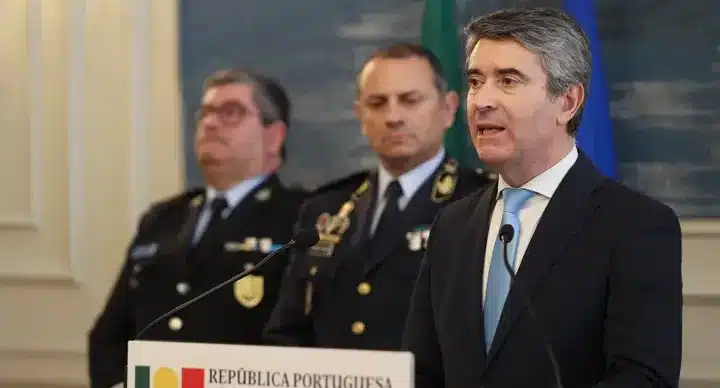PM to address police demands ‘tomorrow’
This morning saw a three hour meeting between the hierarchies of PSP and GNR police and minister of interior administration José Luís Carneiro after protests of recent weeks reached a dangerous tipping point the night before.
On Saturday evening, following a thwarted attempt by some agents reporting for duty ‘handing in their service weapons’ (as another sign of anger in the forces), police opted to ‘call in sick’, which resulted in there not being enough agents to provide security at the Sporting-Famalicão football game.
A second game, due to have been played today, has also had to be ‘suspended’.
But as a result of last night’s 11th hour suspension, fans who had congregated for the game ran amok outside the stadium, leading to six being injured, one of them seriously.
The fracas, and the injuries, were blamed squarely on a lack of police numbers.
According to tabloid Correio da Manhã, 90% of the police due to provide security for the game presented ‘baixas médicas’ (that is, they called in sick) – leading to the icy criticism of the minister in charge of police (José Luís Carneiro), as well as prime minister António Costa, who is understood to have considered the police actions “a very serious insubordination”.
According to Expresso, many (if not all) the sick notes were ‘fraudulent’ (the police were not ill, but using a sick note as another form of protest).
As a result, this morning’s meeting – called on the instructions of José Luís Carneiro – was designed to discuss the inquiry that will now take place (to determine who was properly ill, and who was using the sick note as an excuse).
President Marcelo is said to be following this issue closely. But, as leader writers have stressed, the government has been “playing with fire” in the “careless way” it has been treating police grievances.
Correio da Manhã’s deputy director Alfredo Leite writes: “The careless way (the caretaker government) has treated police demands risks transforming the country, here and there, into a dangerous powder keg that, rather than giving reason to the just struggle of these professionals, favours the political spectrum that takes advantage of it”.
This is the angle taken by the government. Talking to the press after this morning’s meeting, minister Carneiro alluded to “evidence of acts relating to extremist attitudes, behaviour and practices” that had been related to the General Inspectorate of Internal Administration and the Public Prosecutor’s Office, with regard to ‘movements’ within the police service “about a year ago (…) Any new evidence that may establish a link between incitement to insubordination, its practice and possible links to extremist movements will now be reported to the Public Prosecutor’s Office”, he said.
As the meeting went ahead, upwards of 300 police agents stood outside the ministry, dressed in black. One, cited by Lusa, explained: “We are here in support of the GNR commander and director general of the PSP. I hope something positive comes out of (the meeting). I cannot see anything negative because we did not do anything illegal”.
Police fury ratcheted up last week after protests mounted by farmers saw the government hurriedly produce support mechanisms of around €500 million.
Referring to this today, José Luís Carneiro continued in the vein that the two situations were completely different: the caretaker government “does not have the legitimacy to assume permanent and lasting financial burdens for the future”; the support given to farmers is “exceptional” and “not permanent and lasting” (this in itself may do little to help the farmers’ cause, which is by no means settled).
Saturday’s confrontations however saw the platform of police syndicates deliver a letter to the prime minister (and to minister Carneiro) essentially saying ‘treat us equally/ deal with us like you did the farmers or things could get a whole lot worse’.
“Police officers have reached their limits and could desperately go to extreme lengths, like those that are developing across the country”, said the text.
Says Correio da Manhã: “Armando Ferreira, president of Sinapol (the national syndicate of police) admitted last night that with PSP and GNR unrest aggravating the elections of March 10 are at risk”. This is because police transport voting slips to polling stations, as well as the voting urns.
The bottom line of the letter due to be ‘addressed’ by prime minister António Costa tomorrow, is that it is time for the government to act before the anger simmering among the two police forces gets any worse.




















